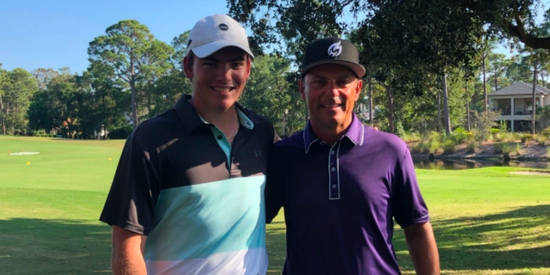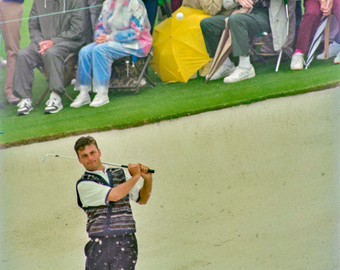
Zerman (right) with student Griffin Steutel (Credit: GolfWeek)
Manny Zerman has lived a life full of great golf stories, both fortunate and unlucky.
In the history of the U.S. Amateur, Manny Zerman is the only male golfer to finish runner-up in consecutive years while never capturing the Havemeyer Trophy. In 1899 and 1900 Findlay Douglas finished runner-up, but he won the event in 1898. In 1902 and 1903 Eban Byers was runner-up, but he rectified his two losses with a win in 1906. Vinney Giles, during the 1965-1972 stroke play era finished in second place three straight years from 1967-1969, but he won the final year the U.S. Amateur was a stroke play event in 1972.
To add to the drama of finishing runner-up, Zerman faced his high school teammate, Phil Mickelson, in the 1990 championship match.
Zerman was born in South Africa and learned to play golf at the heels of his older brother Raymond, a decorated amateur in his own right.
I was blessed with an immense amount of talent,” Zerman said. “I remember compressing the first golf ball I hit at six years old.”
His confidence is not to be confused with arrogance.
He understands, especially looking back thirty years, that he had the talent, but he has admitted he didn’t really love golf. It wasn’t a passion.
“I didn’t wake up every morning with the desire to go and practice for hours,” he said.
He was competitive, though. He later learned that many of his opponents found him intense and intimidating.
“I wasn’t mean or nasty or disrespectful,” Zerman said. "I just focused on what I needed to do out there.”
 Zerman at Augusta National (credit: USA Today)
Zerman at Augusta National (credit: USA Today) Zerman believed golf would open doors for him and help him get to America. As a teenager, it’s hard to believe he pictured his journey unfolding the way it did.
During a visit to play in the Junior World Championship at Torrey Pines, he met the Hogues, a married couple who volunteered at the event every year and hosted players. They grew attached to Zerman and offered to adopt Zerman to help him get to the United States and hone his skills as a golfer.
“I had all the support from them that anybody could have hoped for. It was like I was their child from the womb.”
This was an incredible proposition as Zerman came from a safe and loving family in South Africa. His industrious, resourceful parents, Armando and Miranda, scraped and saved to help Zerman meet his potential. His mother even walked three miles to and from the market to conserve gas for the long trips to the golf course and golf events.
In time, Zerman’s parents agreed it would be the best thing for their son and allowed him to move to San Diego.
“They took care of me like I was their son,” he said. “They paid for everything, supported me. It was incredible.”
It wasn’t just about getting to America, it was also about finding his way out of South Africa.
After finishing high school in his home country, he would have faced a mandatory year of military service. The country as a whole was in the gripes of economic strife as many nations blocked trade with South Africa to mount pressure on their government to end Apartheid. The move to America allowed him to focus on golf and compete against the best amateurs in the country and the world.
He didn’t have to look far to find talented golfers to compete against. He ended up on the University of San Diego High School team with phenom Phil Mickelson. The two stars would play matches after school and became best friends.
“We’d play for five dollars every day,” Zerman said. “We’d hit balls at opposite ends of the range. When we were ready, we’d nod our heads at one another and head to the first tee.”
Those matches at Stardust Country Club were not chummy, fun-loving duels. They were serious.
“We would barely speak to one another during the round,” Zerman said. “And most of those matches came down to the ninth hole.”
The duo was close friends off the golf course, though. As they headed to their respective colleges -- Mickelson to Arizona State and Zerman to rival Arizona -- they grew apart as the competition intensified the friendship dwindled. They simply went in different directions as friendships sometimes do.
However, the two would cross paths again in the championship match of the 1990 U.S. Amateur at Cherry Hills Country Club in suburban Denver, where Mickelson scored a decisive 5 and 4 victory.
As Zerman reflected on that championship match against Mickelson, he said it wasn’t much different than those five-dollar matches they played in high school. They hit balls on the range, shook hands on the first tee, and played their golf.
In 1991, Zerman returned to the U.S. Amateur at The Honors Course, Ooltewah, Tenn. and beat the likes of David Duval and Dicky Pride on his way to the championship match. Pride had a 1-up lead on Zerman with two to play. On the 17th hole, Pride shanked his lay-up into the trees on the par 5; Zerman won on the 19th hole.
The second loss was the most disappointing,” Zerman said. “I ran into a buzzsaw, (Mitch) Voges played out of his mind. He holed putts on undulating greens that were unheard of. But I didn’t put any pressure on him to cause him any trouble.”
The 41-year-old Voges beat Zerman handily, 7 and 6.
His runner-up finishes also earned him spots in the 1990 and '91 Masters. In his first trip to Augusta, he made the cut, but had a tough weekend. Mickelson took home low amateur honors that year. Zerman returned to Augusta National the following year and not only made the cut, but he earned the distinction of being the first foreign-born player to earn low amateur honors.
Over the course of the next eight years, Zerman turned pro and enjoyed success, winning on the Asian and Canadian Tours. However, an epiphany on the first fairway at St. Andrews in the 2000 Open Championship put an abrupt end to his professional touring days.
“I hit my first tee shot on Thursday morning down the first hole walking to the ball I said, ‘I’m done playing,’” Zerman said. “Here I'm walking at a major championship at the Home of Golf and I'm not enjoying myself.”
In a moment of brutal honesty, he told himself he needed to go do something else.
He shot 78 on that Thursday, fired a 68 on Friday and rode off into the sunset.
That decision helped Zerman reestablish his relationship with the game of golf. He took a year away and then returned to teach the game and play 18 holes when he felt like it.
He is now a teaching pro at Miami Shores Country Club and lives on the same street as the course. He has a regular game on Mondays, fulfilling a promise that he would play when, where and with who he wanted. Golf on his terms.
Life is pretty good for Manny Zerman on and off the course. He got married four years ago to Adrianne Natal and is enjoying a settled lifestyle.
Zerman quickly dismisses any thoughts of giving PGA Tour Champions a try. He’s at home in Miami and doesn’t feel any desire to interfere with the good fortune he has found.
“I have my ducks in a row. To go back on the road would start to mess up the applecart,” Zerman said.
From South Africa to San Diego to Miami and everywhere in between, Zerman has experienced life to the fullest. Now, he's ready to enjoy a quiet life and keep that applecart in order.